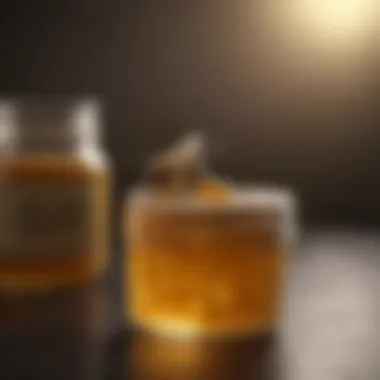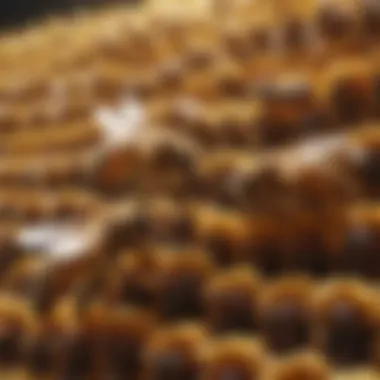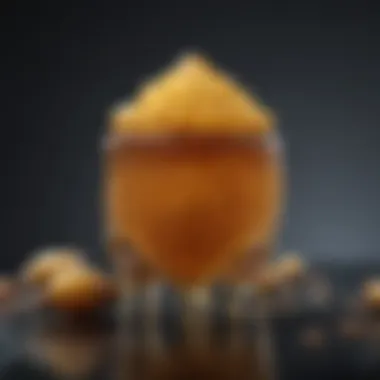Health Benefits of Royal Jelly Explored


Intro
Royal jelly, often touted as a superfood from the hive, holds a nutritional profile and a range of purported health benefits that capture the attention of both scientists and health enthusiasts alike. This unique secretion from honeybees, specifically produced for nourishing queen bees, has piqued interest due to its potential therapeutic properties and contribution to general health and wellness. As traditional medicine intersects with modern science, royal jelly continues to emerge as a topic ripe for exploration.
In this article, we will dissect the various aspects of royal jelly, delving into its rich composition, the mechanisms driving its health benefits, and scientific evidence that bolsters its reputation. From the historical context of its use in folk medicine to cutting-edge research outcomes, readers can expect a thorough understanding of why this substance has captivated minds across ages.
Prolusion to Royal Jelly
Understanding what royal jelly is and its significance in the world of health can’t be understated. Royal jelly is a nutrient-packed secretion produced by worker honeybees to nurture the queen bee and young larvae. This substance, often considered a superfood, holds potential benefits that stretch far beyond hive life.
Royal jelly has been lauded for its myriad health advantages in both traditional and contemporary wellness practices. As interest in natural health solutions grows, so does the exploration into royal jelly’s role in supporting immune function, enhancing skin health, and even impacting reproductive health.
The choice to dive into this topic is not just about uncovering the biological make-up of royal jelly, but also examining how its rich history intertwines with its modern applications.
This article delves into the intricate details surrounding royal jelly, spotlighting its composition, health benefits, and the scientific backing of its therapeutic effects. By the end, readers will not only appreciate the nutritional aspects of this bee product but also gain insight into how it can be a valuable addition to a holistic health regimen.
What is Royal Jelly?
At its core, royal jelly is a milky substance secreted by the glands of worker bees. It is the exclusive diet of the queen bee, which can grow significantly larger than other bees and live much longer. The composition of royal jelly is unique; it contains water, proteins, carbohydrates, lipids, vitamins, and various minerals.
This broad spectrum of nutrients makes it a sought-after ingredient in dietary supplements and natural health products. Interestingly, it has been shown to possess antimicrobial properties, making it a focal point for research into natural remedies.
Essentially, royal jelly serves as the primary food source for young bees, though it is specifically fed to only the larvae destined to become queens. This selective nourishing factor elevates its significance within the hive and adds to its mystique.
History and Origins
The adherence to royal jelly as a gift from nature stretches back to ancient times. Populations in Egypt, Greece, and even China have utilized royal jelly for its purported health benefits for centuries. In ancient Egypt, it was revered and was even integrated into the diets of pharaohs for longevity and vitality.
As early as the 5th century, even Hippocrates, known as the father of medicine, highlighted the merits of bee products in healing and health. The traditional Chinese medicine system embraced royal jelly too, attributing it with abilities to enhance energy and improve overall well-being.
The modern era has seen a revival in interest surrounding royal jelly, leading to various clinical and pharmacological studies. This has been partly fueled by the global movement geared towards natural health solutions, prompting researchers to investigate its benefits with scientific rigor. By tracing the history of royal jelly, one can come to appreciate its longstanding place in both folklore and scientific inquiry.
Composition of Royal Jelly
Understanding the composition of royal jelly is crucial for grasping its health benefits and applications. This unique substance is more than just a food for the queen bee; it’s a powerhouse of nutrition. Knowing what goes into royal jelly helps in appreciating its diverse effects on human health, making it a topic of great relevance for students, researchers, educators, and professionals alike.
Nutritional Elements
Royal jelly is teeming with a variety of nutrients that contribute to its impressive reputation. Primarily, it contains:
- Proteins: About 12–15% of royal jelly is made up of proteins, which are fundamental for growth, development, and overall bodily functions. These proteins include a variety of amino acids, some of which are essential and cannot be synthesized by the human body.
- Carbohydrates: Around 10–15%, mainly in the form of sugars, offer quick energy sources. The predominant sugar is fructose, which is easily absorbed, providing an instant energy boost without the crash that usually accompanies refined sugars.
- Fats: Though in smaller amounts, the fatty acid profile of royal jelly is noteworthy. It contains significant levels of short- and medium-chain fatty acids that may possess various health-promoting properties.
- Vitamins and Minerals: It's rich in B vitamins, including B2, B3, B5, and B6, which are essential for energy metabolism and maintaining skin health. Furthermore, minerals such as calcium, potassium, and magnesium play vital roles in many physiological processes.
Understanding the nutritional elements of royal jelly translates directly into its potential health benefits. A balanced intake of these nutrients supports immune function, skin vitality, and possibly enhances overall well-being.
Bioactive Compounds


Beyond its base nutrients, royal jelly contains bioactive compounds that set it apart from other elements in the diet. Some key bioactive components include:
- Royalactin: A protein that is primarily responsible for the development of queen bees. Studies hint that this compound might have implications for promoting cellular regeneration in humans, potentially impacting anti-aging processes.
- Phenolic Compounds: These serve as antioxidants that can combat oxidative stress within the body. The free radicals in our systems can lead to cellular damage, making the presence of these compounds within royal jelly a significant factor for health protection.
- Enzymes: Various enzymes found in royal jelly aid in metabolic processes, enhancing digestion and nutrient absorption, making this substance even more beneficial in a diet.
"Royal jelly is not just a treat for bees; it holds the potential to inspire health benefits in humans due to its complex mix of nutrients and bioactive compounds."
In summary, grasping the composition of royal jelly equips individuals with a foundational understanding to appreciate its role in health and wellness. This insight into its nutritional elements and bioactive compounds lays the groundwork for exploring its myriad health benefits, further solidifying royal jelly's prominent position in both traditional and modern nutritional perspectives.
Health Benefits of Royal Jelly
Understanding the health benefits of royal jelly is crucial for anyone interested in natural supplements and holistic well-being. This substance, produced by worker bees to nourish the queen bee, is renowned for its potential in enhancing various aspects of health. From boosting the immune system to improving skin health and supporting reproductive functions, royal jelly is not just a dietary supplement; it’s a powerhouse packed with nutrients that can bring remarkable changes to one's health.
Support for Immune Function
Royal jelly may play a pivotal role in supporting the body's immune system. Rich in vitamins, minerals, and antioxidants, it helps fortify the body's defenses against infections and diseases. The polyphenols found in royal jelly are particularly noteworthy. These compounds have been shown to exhibit anti-inflammatory properties, assisting the body in managing immune responses more effectively.
For instance, some studies suggest that royal jelly can increase the production of immune cells, which are essential for fighting off pathogens. The increase in white blood cell production means your body is better equipped to combat infections. Some individuals even report fewer colds and flu episodes after incorporating royal jelly into their routines.
Enhancement of Skin Health
When it comes to skin health, royal jelly shines brightly as a natural remedy. The compound is rich in water-soluble vitamins, specifically vitamins B2 and B5, that have been linked to improved skin hydration and elasticity. Many skincare brands now include royal jelly in their products, touting its ability to promote youthful and vibrant skin.
Research suggests that using royal jelly can aid in wound healing too. The remarkable healing properties stem from its anti-bacterial and anti-inflammatory characteristics. Applying products containing royal jelly may reduce acne scars or other blemishes, leading to a clearer complexion. Essentially, if one's skin is in distress, royal jelly can be a golden ticket for recovery.
Impact on Reproductive Health
Royal jelly also holds promise in the realm of reproductive health. Some studies hint that it might help in regulating reproductive hormones, potentially benefiting both women and men. For women, this could mean alleviating symptoms associated with menstrual irregularities. Additionally, some anecdotal evidence suggests that royal jelly might enhance fertility, although more research is needed in this area to draw definitive conclusions.
For men, royal jelly has been linked to improvements in sperm quality and quantity. This improvement can be crucial for those facing fertility issues. In essence, whether it’s to regulate cycles or enhance fertility prospects, including royal jelly in one’s diet might just be a step in the right direction.
"Royal jelly, a natural wonder, offers a diverse array of health benefits worth exploring for anyone keen on improving their wellness."
By understanding these benefits better, individuals can make informed decisions about incorporating royal jelly into their daily routines. The potential advantages stretch far and wide, reaching deep into critical aspects of health, making it an intriguing topic worthy of further exploration.
Scientific Research on Royal Jelly
The examination of royal jelly through scientific research represents a crucial layer in understanding its multifaceted benefits. Unlike folklore or anecdotal evidence, scientific inquiry provides a rigorous foundation that backs up the claims surrounding this nutrient-dense substance. With the global trend leaning towards natural remedies, it becomes increasingly important to sift through the hype and focus on empirical data that determines the efficacy of royal jelly in various health contexts.
In recent years, researchers have delved into clinical studies, unveiling a treasure trove of information regarding the specific health benefits royal jelly might offer. This exploration is critical because it links the rich historical use of royal jelly in traditional medicine with modern scientific validation.
Clinical Studies and Findings
Numerous clinical studies have emerged, highlighting royal jelly’s potential in areas such as immune support, skin health, and reproductive systems. For instance, a double-blind, placebo-controlled trial with participants suffering from chronic fatigue syndrome showed notable improvements in energy levels and overall feelings of well-being after they incorporated royal jelly into their diets. Likewise, other studies point to its potential in controlling blood glucose levels, suggesting that individuals with diabetes could benefit from this bee product. In practical terms, those results reflect a broader population's potential, contributing to the growing interest in natural and holistic health solutions.
"Royal jelly is not merely a health fad; it has the potential to provide substantial health benefits validated by scientific research."


Moreover, beyond these outcomes, some findings have indicated that royal jelly contributes to enhanced fertility metrics, making it attractive for those struggling with reproductive health issues. Yet, it remains paramount for researchers to engage in more extensive, diversified studies to fully comprehend the mechanics behind these benefits and solidify the claims made.
Mechanisms of Action
Understanding the mechanics of how royal jelly functions within the body can often feel like piecing together a complex puzzle. The intricacies of its components play a pivotal role in producing its effects. Royal jelly is rich in proteins, amino acids, and unique bioactive compounds such as flavonoids and phenolic acids, which contribute significantly to its diverse health benefits.
One of the notable mechanisms attributed to royal jelly is its influence on cell growth and regeneration. Research suggests that certain proteins found in royal jelly stimulate cell division, which may be beneficial not only for repairing tissues but also for rejuvenating skin health.
The high antioxidant levels in royal jelly also play a crucial part in combatting oxidative stress. This might serve to bolster the immune system and improve overall health, thus providing another layer of support for its potential health benefits. Additionally, the bioactive compounds have demonstrated anti-inflammatory properties, which might be key in managing chronic health conditions.
Potential Therapeutic Applications
The discussion of the potential therapeutic applications of royal jelly is crucial in this article because it bridges traditional uses with contemporary medical understanding. We find ourselves at a unique crossroads where age-old practices meet scientific inquiry. Royal jelly has been utilized for centuries in various cultures, touted for its ability to enhance health and wellness. This section will delve into how royal jelly fits into complementary medicine and its implications for disease prevention.
Royal Jelly in Complementary Medicine
Complementary medicine often includes various natural substances to support health, among which royal jelly is a prominent player. Its rich composition—containing vitamins, minerals, amino acids, and fatty acids—makes it a compelling candidate for holistic practices. Many practitioners of complementary medicine integrate royal jelly to enhance overall wellness rather than treat specific illnesses.
Royal jelly may be seen as a boon for those interested in promoting vitality and longevity. Anecdotal evidence suggests that individuals who consume royal jelly regularly report increased energy levels and improved resilience against stress. However, it's always vital to proceed with caution; the body reacts differently to natural products, and individual experiences may vary.
Benefits include:
- Nutritional support: Enhances daily intake of essential nutrients.
- Enhanced recovery: Assists athletes in recovery after intense physical activity.
- Stress adaptation: May help in managing and adapting to stress more effectively.
Yet, comprehensive clinical studies are still needed to underline these claims. Thus far, we see a fascinating potential for royal jelly as a complementary health option but must approach it with an open mind and critical eye.
"Royal jelly is not a cure-all, but when used thoughtfully, it can contribute to a holistic approach to health and well-being."
Role in Disease Prevention
The preventive dimensions of royal jelly are intriguing and deserve attention. With a backdrop of rising interest in natural products for health maintenance, many proponents argue that including royal jelly in one's diet could mitigate the risks of various ailments. Its antioxidant properties may play a role here. Some studies suggest that royal jelly could combat oxidative stress, a factor often linked to various disease states, including cardiovascular diseases and at certain levels, cancer.
Incorporating it as a dietary supplement could help bolster the body's defenses and immune response. Some potential benefits regarding disease prevention include:
- Cardiovascular health: There’s some evidence highlighting a potential role in reducing cholesterol levels and improving blood circulation.
- Anti-inflammatory effects: It may aid in reducing inflammation, a contributing factor to numerous chronic diseases.
- Potential cancer protective qualities: Some laboratory research hints at its ability to inhibit cancer cell growth, though more studies are necessary to support this.
As with any natural remedy or supplement, consultation with healthcare professionals is highly recommended to navigate its use safely and effectively. The interplay of royal jelly with conventional medicine continues to evolve, paving the way for further research that might affirm its place in disease prevention strategies.
Safety and Side Effects
Understanding the safety and potential side effects of royal jelly is an important aspect of utilizing this natural substance. Individuals keen on incorporating royal jelly into their health regimen must be aware of how it might interact with their bodies or preexisting conditions. Knowledge in this area not only safeguards health but also enhances the benefits one can derive from this nutrient-rich product.
Allergic Reactions
One of the primary concerns regarding royal jelly is the possibility of allergic reactions. Some folks can be quite sensitive to bee products, hence having an allergy to royal jelly is not uncommon. Symptoms can range from mild to severe, and they typically manifest as:


- Skin reactions: Hives, rashes, or itching can occur shortly after ingestion or contact.
- Respiratory issues: Wheezing, difficulty in breathing, or nasal congestion might arise for some individuals.
- Anaphylactic shock: Though it's rare, this life-threatening reaction is a severe possibility for those who are highly allergic. Symptoms include swelling, a rapid drop in blood pressure, and even loss of consciousness.
It's wise to conduct a patch test, where a small amount of royal jelly is applied to the skin, to measure sensitivity prior to full use. For people with a history of allergies to bee venom or other bee products, consulting a healthcare professional before trying royal jelly is highly recommended.
Contraindications
Certain conditions may warrant caution when it comes to using royal jelly. People ought to be informed about contraidications to avoid potential health risks. The following are some situations where royal jelly may be less advisable:
- Pregnancy and breastfeeding: Limited studies investigate the effects of royal jelly during these periods. Hence, it’s often best to err on the side of caution and avoid it unless specifically recommended by a healthcare provider.
- Autoimmune diseases: Individuals with autoimmune conditions, such as lupus or rheumatoid arthritis, might find that royal jelly triggers an exacerbation of symptoms.
- Medications: Royal jelly can interact with certain medications, especially blood thinners or medications altering blood sugar levels. Having a chat with a doctor regarding medication history is crucial.
In summary, while royal jelly offers numerous potential health benefits, it’s imperative to tread carefully due to possible allergic reactions and contraindications. The goal remains to safely incorporate this remarkable substance into daily life. Always prioritize health and consult the right professionals to ensure a safe experience with royal jelly.
How to Incorporate Royal Jelly into Your Diet
Incorporating royal jelly into your diet can be a simple yet transformative step towards boosting your overall health. Given the myriad of nutrients and bioactive compounds packed within this unique substance, understanding how to effectively add it to your daily regimen is paramount. Many may wonder: What is the best way to consume royal jelly? How can one safely enjoy its benefits? These questions are crucial for any individual interested in optimizing their health.
Forms of Royal Jelly Available
Royal jelly is available in several forms, each catering to different preferences and dietary needs. Here are the primary types:
- Fresh Royal Jelly: This is the most potent form, straight from the hive. It has a thick, creamy texture and a distinct taste. Best for those who want maximum benefits, but it requires proper refrigeration due to its perishable nature.
- Powdered Royal Jelly: Ideal for those who prefer a longer shelf life. After drying, it's often mixed with honey or used in smoothies. The nutrient density remains, although some active compounds might diminish slightly during processing.
- Capsules and Softgels: These are convenient for quick consumption, especially for people on-the-go. They provide a clear dosage, which can be particularly appealing for those who don’t enjoy the taste of raw royal jelly.
- Royal Jelly in Honey: Mixing royal jelly with honey combines the goodness of both. This form is sweeter and often more palatable, making it a smooth addition to teas or bread.
Each form has its unique appeal, and the choice hinges on personal preferences, lifestyle, and how one perceives taste.
Recommended Dosage
Determining the appropriate dosage can be a bit tricky, as it might vary depending on individual health goals and overall lifestyle. Here are some general guidelines to consider:
- For Daily Health Maintenance: A standard dosage ranges from 250 mg to 500 mg of fresh royal jelly per day. This amount is often cited as sufficient for most adults to reap the beneficial effects without overwhelming the system.
- For Specific Health Goals: If aiming for more targeted benefits, such as improved immunity or skin health, increasing the dose to about 1,000 mg might be warranted. However, always consult with a healthcare professional before making such adjustments.
- Children: For younger individuals, it's prudent to start with half the adult dosage and monitor for any adverse reactions. The immune system of children is still developing, so caution is key.
Remember, introducing new supplements into your regimen should be done mindfully. Consider starting with lower dosages and monitoring how your body reacts before increasing.
"Royal Jelly is not just food; it's a unique source of vitality that demands respect and careful integration into your diet."
Incorporating royal jelly effectively means not just understanding its forms and dosages but also being aware of timing and method of consumption. For instance, taking it on an empty stomach might enhance absorption, while blending it into morning smoothies can seamlessly blend health with taste. Either way, the journey toward a healthier life with royal jelly begins with mindful incorporation.
Epilogue
As we wrap this exploration of royal jelly, it becomes clear how much this remarkable substance has to offer in terms of health and wellness. Understanding the importance of incorporating royal jelly into one’s diet is essential, not just for its nutritional benefits, but also for its potential therapeutic effects. This natural product provides a blend of vitamins, minerals, and bioactive compounds that can support various physiological functions and enhance overall well-being.
Summary of Benefits
Royal jelly is often highlighted for several key health benefits:
- Immune Support: Its rich array of antioxidants can bolster the immune system, aiding in the fight against infections.
- Skin Health: Regular consumption may contribute to improved skin hydration and elasticity, making it a sought-after ingredient in cosmetic and skincare products.
- Hormonal Balance: Some studies suggest it can assist in regulating hormonal levels, which is particularly beneficial for reproductive health.
These benefits arise from a well-rounded composition that includes nutrients vital to cellular function, as well as unique compounds that may provide protection against diseases.
Final Thoughts on Royal Jelly
"Royal jelly is more than just a honeybee byproduct; it's a tapestry of nutrients that can weave health into the lives of those who choose to embrace it."
In sum, incorporating royal jelly could lead to noticeable improvements in various areas of health and wellness, making it a worthy consideration for anyone seeking balance in their nutritional regimen.



